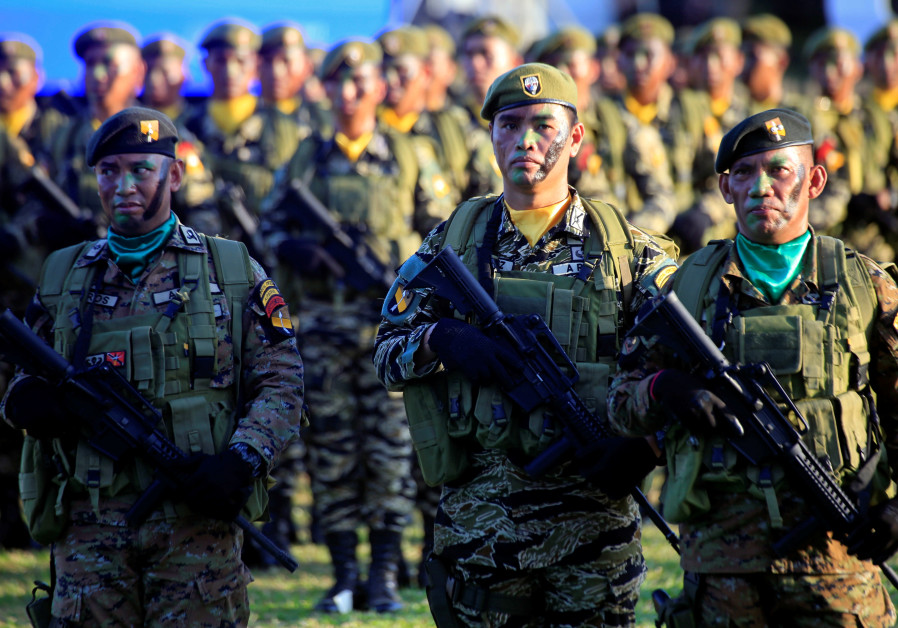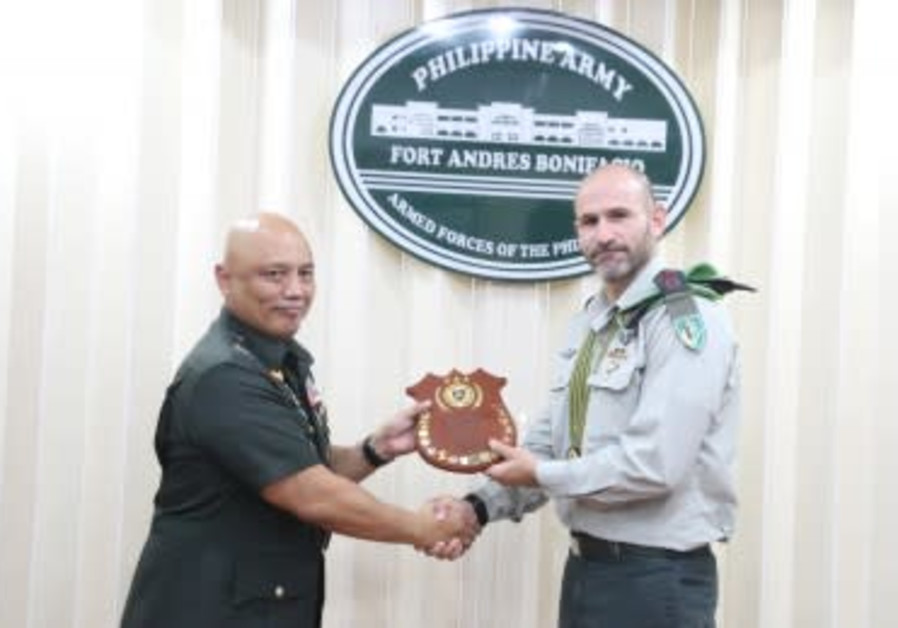Philippine Army chief Lt.-Gen. Macairog Alberto said that the Counter-Terrorism Trainers' Training was part of the program to hone and improve the antiterror skills of its troops.

Soldiers holding their weapons stand on attention during the 121st anniversary celebration of the Philippine Army at Taguig city, Metro Manila, Philippines March 20, 2018. (photo credit: ROMEO RANOCO/REUTERS)
A delegation of IDF troops trained their Philippine counterparts in counter-terrorism methods despite ongoing concerns of human rights abuses by the government of Rodrigo Duterte, The Jerusalem Post has learned.
The 10-man IDF delegation led by Col. Dan Goldfus, commander of the Nahal Brigade, spent two weeks training 175 Filipino elite unit officers at Fort Bonifacio, Taguig, north of Manila.
Read More Related Articles

The 10-man IDF delegation led by Col. Dan Goldfus, commander of the Nahal Brigade, spent two weeks training 175 Filipino elite unit officers at Fort Bonifacio, Taguig, north of Manila.
Read More Related Articles

IDF Col. Dan Goldfus receives plaque in the Philippines. (Philippine Army Public Affairs Office)
The troops trained by the IDF delegation were in the Philippine’s special units including the Special Forces, First Scout Rangers, and Light Reaction regiments, as well as troops from the 2nd, 5th, 7th, and 9th Infantry Divisions.
Philippine army chief Lt.-Gen. Macairog Alberto was quoted by local media as saying that the Counter-Terrorism Training was part of a program to hone and improve the anti-terror skills of its troops.
Alberto was quoted by PhilipineStar news site as saying that the collaboration with the IDF and other armies in addressing terror is necessary after the siege of Marawi on the island of Mindanao in 2017.
“The Philippine Army sees the collaboration with other armies in addressing terrorism as necessary after its experience during the Marawi Siege in 2017,” Alberto said, adding that “terrorism is a complex threat that requires international cooperation and the continuous exchange of knowledge and information.”
Most Recent Videos from the Jerusalem Post
The Philippine army battled against Islamic State terrorists in Marawi for five months, killing over 1,200 people and leading 200,000 residents to flee. The siege reduced the city to rubble, and led the government to impose a state of martial law twice on the island of Mindanao, which raised fears by human rights groups of human rights abuses.
While it marked the first time that IDF troops have trained Filipino troops, the two countries maintain close security ties as Israel has sold a large amount of weaponry to the Philippine army over the years. Due to tensions in the South China Sea, the overall flow of arms to the region has spiked.
During Duterte’s last visit to Israel, over 20 agreements worth nearly $83 million were reportedly signed. The Philippine News Agency reported that 14 memorandums of agreement and understanding were signed, as well as eight letters of intent from Israeli firms interested in investing in the Asian country.
“These agreements are a clear indication of the enormous business and investment opportunities in the Philippines available to Israelis,” Philippine Trade Secretary Ramon Lopez was quoted as saying at the time. “The Philippines is committed to pursue several growth opportunities by strengthening partnerships with emerging economic partners like Israel. Our engagement with them allows us to reinvigorate ties and increase trade between our countries.”
Duterte has said that he sees Israel as an alternative supplier of weapons, and during his visit he told President Reuven Rivlin that he intends to buy military equipment exclusively from Israel because of the country’s lack of restrictions, unlike the US and others who have refused to sell him arms over human rights violations.
Human rights attorney Itay Mack told the Post on Thursday that while there remains significant human rights concerns with the police, “with the military it depends on what the Philippine army will do with the training in the future.”
According to Mack, there are different rebel groups on the island of Mindanao, some who have made alliances with the Islamic State and others who have been fighting the government for decades.
“In the past few years the Philippines need the support for the fight against ISIS,” Mack said, explaining that the IDF is not the only army that has trained the Philippine military. But the small delegation size could be that it was “more of a show of political support,” he said. “The Philippines have real problems with security, but they are not really dealing with that, rather they are focusing on their war on drugs... It’s a complex situation.”
In late December, Mack and other Israeli attorneys filed a lawsuit with the High Court demanding that Israel refrain from selling arms, weapons systems, and military defense systems to the Philippines, on the basis that it’s a country that violates human rights. The lawsuit said that Duterte is “a mass murderer, supports violence against women, has bombed the schools of minority children, and has equated himself with Hitler.”
The Philippines has cracked down on drug dealers and users with Duterte launching a controversial “war” on drug trade, which according to international human rights organizations such as Human Rights Watch, has killed over 12,000 people.
Philippine army chief Lt.-Gen. Macairog Alberto was quoted by local media as saying that the Counter-Terrorism Training was part of a program to hone and improve the anti-terror skills of its troops.
Alberto was quoted by PhilipineStar news site as saying that the collaboration with the IDF and other armies in addressing terror is necessary after the siege of Marawi on the island of Mindanao in 2017.
“The Philippine Army sees the collaboration with other armies in addressing terrorism as necessary after its experience during the Marawi Siege in 2017,” Alberto said, adding that “terrorism is a complex threat that requires international cooperation and the continuous exchange of knowledge and information.”
Most Recent Videos from the Jerusalem Post
The Philippine army battled against Islamic State terrorists in Marawi for five months, killing over 1,200 people and leading 200,000 residents to flee. The siege reduced the city to rubble, and led the government to impose a state of martial law twice on the island of Mindanao, which raised fears by human rights groups of human rights abuses.
While it marked the first time that IDF troops have trained Filipino troops, the two countries maintain close security ties as Israel has sold a large amount of weaponry to the Philippine army over the years. Due to tensions in the South China Sea, the overall flow of arms to the region has spiked.
During Duterte’s last visit to Israel, over 20 agreements worth nearly $83 million were reportedly signed. The Philippine News Agency reported that 14 memorandums of agreement and understanding were signed, as well as eight letters of intent from Israeli firms interested in investing in the Asian country.
“These agreements are a clear indication of the enormous business and investment opportunities in the Philippines available to Israelis,” Philippine Trade Secretary Ramon Lopez was quoted as saying at the time. “The Philippines is committed to pursue several growth opportunities by strengthening partnerships with emerging economic partners like Israel. Our engagement with them allows us to reinvigorate ties and increase trade between our countries.”
Duterte has said that he sees Israel as an alternative supplier of weapons, and during his visit he told President Reuven Rivlin that he intends to buy military equipment exclusively from Israel because of the country’s lack of restrictions, unlike the US and others who have refused to sell him arms over human rights violations.
Human rights attorney Itay Mack told the Post on Thursday that while there remains significant human rights concerns with the police, “with the military it depends on what the Philippine army will do with the training in the future.”
According to Mack, there are different rebel groups on the island of Mindanao, some who have made alliances with the Islamic State and others who have been fighting the government for decades.
“In the past few years the Philippines need the support for the fight against ISIS,” Mack said, explaining that the IDF is not the only army that has trained the Philippine military. But the small delegation size could be that it was “more of a show of political support,” he said. “The Philippines have real problems with security, but they are not really dealing with that, rather they are focusing on their war on drugs... It’s a complex situation.”
In late December, Mack and other Israeli attorneys filed a lawsuit with the High Court demanding that Israel refrain from selling arms, weapons systems, and military defense systems to the Philippines, on the basis that it’s a country that violates human rights. The lawsuit said that Duterte is “a mass murderer, supports violence against women, has bombed the schools of minority children, and has equated himself with Hitler.”
The Philippines has cracked down on drug dealers and users with Duterte launching a controversial “war” on drug trade, which according to international human rights organizations such as Human Rights Watch, has killed over 12,000 people.
The IDF did not respond to request for comment by press time.
https://www.jpost.com/Israel-News/IDF-troops-train-Philippine-counterparts-in-counterterror-tactics-595373

No comments:
Post a Comment
Note: Only a member of this blog may post a comment.